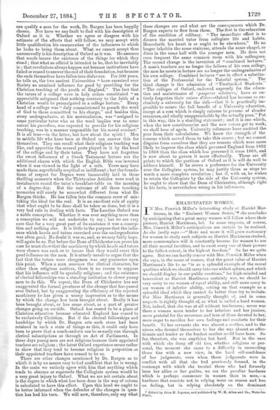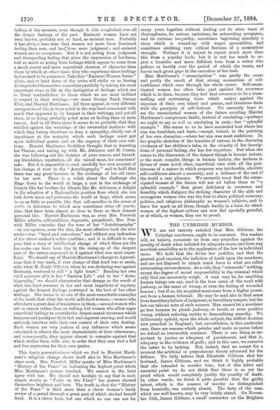EMANCIPATED WOMEN.
IN Mrs. Fenwick Miller's interesting study of Harriet Mar- tineau, in the " Eminent Women Series,"* she concludes by anticipating that a great many women will follow where their pioneer, Harriet Martineau, led. In some respects, of course, Mrs. Fenwick Miller's anticipations are certain to be realised. As she justly says :—" More and more it will grow customary for women to study such subjects as Harriet Martineau studied, more commonplace will it constantly become for women to use all their mental faculties, and to exert every one of their powers to the fullest extent, in the highest freedom." So far we quite agree. But we can hardly concur with Mrs. Fenwick Miller when she says, in the name of women, that the great value of Harriet Martineau's life to us "is as a splendid example of the moral qualities which we should carry into our widest sphere, and which we should display in our public exertions," for high-minded and benevolent as Harriet Martineau certainly was, we should be very sorry to see women of equal ability, and still more sorry to see women of inferior ability, setting up that example as a splendid ideal which they cannot do better than try to imitate. For Miss Martineau is generally thought of, and in some respects is rightly thought of, as what is called a hard woman. Not, indeed, that she was at all without tenderness ; never was there a woman more tender to her inferiors and her juniors, more grateful for the reverence and love of those devoted to her, more eager to sacrifice her own feelings and comforts for their benefit. To her servants she was almost a mother, and to the nieces who devoted themselves to her she was almost as affec- tionate and tender as the fondest mother could have been. So far, therefore, she was anything but hard. But in the ease with which she flung off old ties, whether religious or per- sonal, the moment she came to a difficulty in reconciling those ties with a new view, in the hard self-confidence of her judgments, even when those judgments were in conflict with all that she had previously formed, in the contempt with which she treated those who had formerly been her allies or her guides, we see the peculiar hardness which is perhaps commoner in women than in men,—a hardness that consists not in relying more on reason and less on feeling, but in relying absolutely on the dominant • Edited by John H. Ingram, and published by W. H. Allen and Co., Waterloo Place.
feeling of the moment, even though it ride roughshod over all the deeper feelings of the past. Eminent women have not been harder, probably not so hard, as eminent men. Probably it has always been true that women act more from dominant feeling than men, and less: from mere judgment ; and eminent women are no exceptions. But it is not acting from judgment and disregarding feeling that gives the impression of hardness, half so much as acting from feelings which appear to come from a much poorer and more superficial stratum of character than those by which at other times they who experience these feelings had seemed to be possessed. Take this "Eminent Women Series" alone, and at least three of the series will strike us as having distinguished themselves somewhat painfully by taking the most important steps in life at the instigation of feelings which are in direct contradiction to those which we are most inclined to respect in their writings,—we mean George Sand, George Eliot, and Harriet Martineau. All three appear, in very different emergencies of life, to have acted in the way least consonant with mach that appeared to be deepest in their writings, and yet all three, in so doing, probably acted more on feelhig than on mere reason. And in all three cases it seems to us probable that they rebelled against the warnings of the reverential instincts with which they betray elsewhere so deep a sympathy, chiefly out of impatience at the restraint which such feelings must put upon individual genius and on the urgency of their own voli- tion. Harriet Martineau doubtless thought that in deserting her Theism, and taking up with Mr. Atkinson and M. Comte, she was following out the dictates of pure reason, and hazard- ing friendships, reputation, all she valued most, for conscience' sake. But it is impossible to read carefully her own account of her change of view in the " Autobiography " and to hold that there was any great heroism in the exchange of her old views for her new. There is a relish about the challenge she flings down to the world at large, a zest in the exchange of friends like her brother for friends like Mr. Atkinson, a delight in the adoption of a Rationalistic position from which she can look down upon and patronise the world at large, which seems to us as little as possible like that self-sacrifice in the cause of truth. in deference to which men sometimes strip off convic- tions that have been almost as close to them as their dearest personal ties. Harriet Martineau was, as even Mrs. Fenwick Miller admits, self-confident, dogmatic, prejudiced ; Mrs. Fen- wick Miller concedes that the tone of her "Autobiography" —in our opinion, none the less, the most effective book she ever wrote—was "hard and censorious," and without any indication of the clever author's softer qualities ; and it is difficult to sup- pose that a story of intellectual change of which these are the key-notes can have been due to the rising-up of the deepest part of the nature expressed in it against what was most super- ficial. We should say of Harriet Martineau's change to Agnosti- cism that it was made, if ever change of that kind was so made, with what M. Emile 011ivi er, when he was declaring war against Germany, ventured to call " a light heart." Reading her own vivid accounts of it in her " Eastern Life " and in her " Auto- biography," we should characterise that change as the revolt of what was least reverent in her and most impatient of mystery against the deepest feelings portrayed in the best of her other writings. She seems to us one of the most remarkable examples of the truth that what the world calls hard women,—women who often have a great deal of tenderness in them,—are not women who act on reason rather than on feeling, but women who allow eager superficial feelings to override the deeper-seated reverence which hampers and paralyses their last and eagerest craving, and would seriously interfere with their own control of their own destiny. Such women are very jealous of any influence which seems calculated to silence the most characteristic of their utterances ; and consequently, they appear almost to conspire against that which strikes them with awe, in order that they may find a full and free expression for their own genius.
This hasty peremptoriness which we find in Harriet Marti- neau's religious change shows itself also in Miss Martinean's other work. Mrs. Fenwick Miller speaks of Miss Martineau's " History of the Peace" as indicating the highest point which Miss Martineau's powers touched. We cannot in the least agree with her. We should not hesitate to say that in such simple stories as " Feats on the Fiord " her powers showed themselves brightest and best. The truth is, that the "History of the Peace " is little more than a clever woman's hasty review of a period through a great part of which she had herself lived. It is a clever book, but one which no one can use for many years together without finding out its utter want of thoroughness, its serious omissions, its astounding arrogance, and its extreme inequality, sometimes beginning minutely a story which is wound-up with vague generalities, and sometimes omitting very critical features of a momentous struggle. Perhaps it is unjust to expect much more than this from a popular book; but it is not too much to ex- pect a humbler and more diffident tone from a writer who gallops so hastily over the period of which she treats, and leaves such great gaps in the execution of her task.
Miss Martineau's " emancipation " was partly the cause and partly the result of that strong momentum of self- confidence which runs through her whole career. Self-eman- cipated women too often take part against the reverence which is in them, because they feel that reverence to be a tram- melling and restraining force which makes against the impulses of their own talent and genius, and threatens them with the paralysis of self-distrust. We earnestly hope to see the emancipated women of the future avoiding Harriet
Martineau's conspicuous faults, instead of emulating,—perhaps we ought to say as well as emulating in part, —her " splendid
example." She seems to us to have succeeded best where her aim was humblest, and least,—except, indeed, in the painting of her own character,—where her aim was most ambitious. In her graphic sketches of the beauties of nature, in the charming vividness of her children's tales, in the vivacity of her descrip- tions of personal feeling, she has few superiors. But when she comes to the discussion of the deepest things in human nature, or the most complex things in human history, she declares in favour of some novel, clear, superficial view with all the posi- tiveness of a nature to which suspense was intolerable, absolute self-confidence almost a necessity, and a defiance of the rest of the world a rare pleasure. We earnestly trust that the eman- cipated women of the future will not set before them as " a splendid example " that great deficiency in reverence and humility which disfigure the striking character of the able and . courageous woman who was the first to claim political economy, politics, and religious philosophy as women's subjects, and to leave her mark on all three, though hardly in a form for which women of the highest culture can now feel specially grateful, or of which, as women, they can be proud.



































 Previous page
Previous page